Carl Sagan Quotes
Most popular Carl Sagan Quotes

Science as a Candle in the Dark.

Understanding is a kind of ecstasy.

All inquiries carry with them some element of risk.

You have to know the past to understand the present.
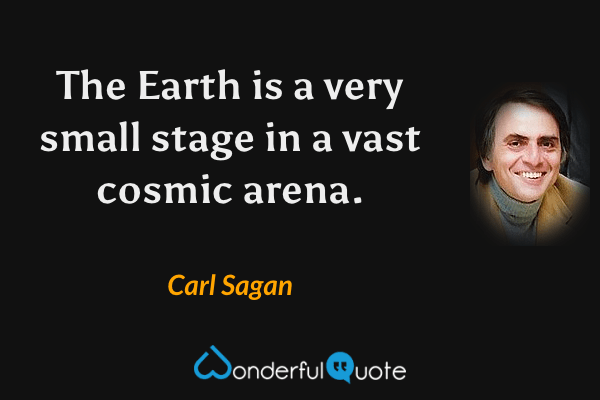
The Earth is a very small stage in a vast cosmic arena.

Somewhere, something incredible is waiting to be known.

Where we have strong emotions, we're liable to fool ourselves.

Once you give a charlatan power over you, you almost never get it back.
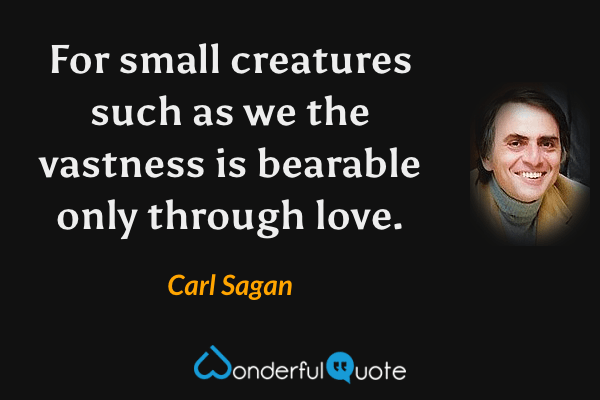
For small creatures such as we the vastness is bearable only through love.
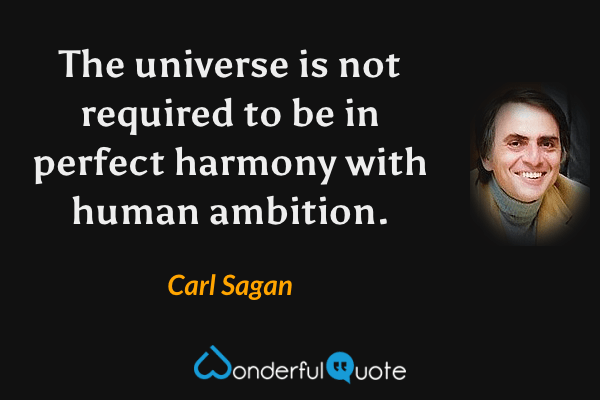
The universe is not required to be in perfect harmony with human ambition.

Many other animals have feelings. What distinguishes our species is thought.

If you want to make an apple pie from scratch, you must first create the universe.
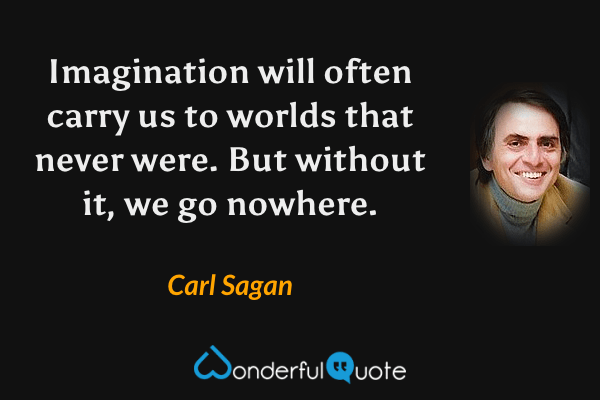
Imagination will often carry us to worlds that never were. But without it, we go nowhere.
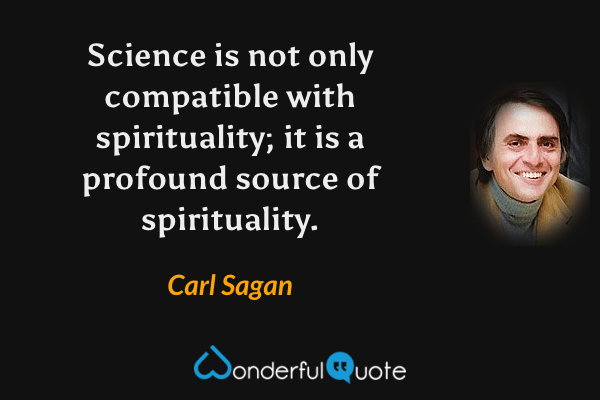
Science is not only compatible with spirituality; it is a profound source of spirituality.

We make our world significant by the courage of our questions and the depth of our answers.

The brain is like a muscle. When it is in use we feel very good. Understanding is joyous.

The words "question" and "quest" are cognates. Only through inquiry can we discover truth.

We make our world significant by the courage of our questions and by the depth of our answers.

The highest compliment they were capable of paying was that in their minds she was not overtly female.

I think the discomfort that some people feel in going to the monkey cages at the zoo is a warning sign.

Books are like seeds. They can lie dormant for centuries and then flower in the most unpromising soil.

The beauty of a living thing is not the atoms that go into it, but the way those atoms are put together.

It is tension between creativity and skepticism that has produced the stunning and unexpected findings of science.

It is far better to grasp the Universe as it really is than to persist in delusion, however satisfying and reassuring.

A celibate clergy is an especially good idea, because it tends to suppress any hereditary propensity toward fanaticism.

Skeptical scrutiny is the means, in both science and religion, by which deep thoughts can be winnowed from deep nonsense.

For me, it is far better to grasp the Universe as it really is than to persist in delusion, however satisfying and reassuring.
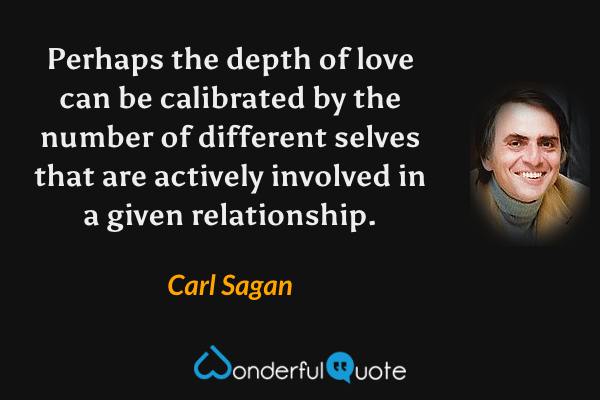
Perhaps the depth of love can be calibrated by the number of different selves that are actively involved in a given relationship.

Except for children who don't know enough not to ask the important questions, few of us spend time wondering why nature is the way it is.

In Mozambique, the story goes, monkeys do not talk, because they know if they utter even a single word some man will come and put them to work.

Modern science has been a voyage into the unknown, with a lesson in humility waiting at every stop. Many passengers would rather have stayed home.

All of the books in the world contain no more information than is broadcast as video in a single large American city in a single year. Not all bits have equal value.

If we like them, they're freedom fighters ... If we don't like them, they're terrorists. In the unlikely case we can't make up our minds, they're temporarily only guerrillas.

She began to understand why lovers talk baby talk to one another. There was no other socially acceptable circumstance in which the children inside her were permitted to come out.

Without even noticing, just as astronomy entered a golden age most people cut themselves off from the sky, a cosmic isolationism that ended only with the dawn of space exploration.

We live in a society exquisitely dependent on science and technology, in which hardly anyone knows anything about science and technology. This is a clear prescription for disaster.

I try not to think with my gut. If I'm serious about understanding the world, thinking with anything besides my brain, as tempting as that might be, is likely to get me into trouble.

We are the only species on the planet, so far as we know, to have invented a communal memory stored neither in our genes nor in our brains. The warehouse of that memory is called the library.

Who are we? We find that we live on an insignificant planet of a humdrum star lost in a galaxy tucked away in some forgotten corner of a universe in which there are far more galaxies than people.
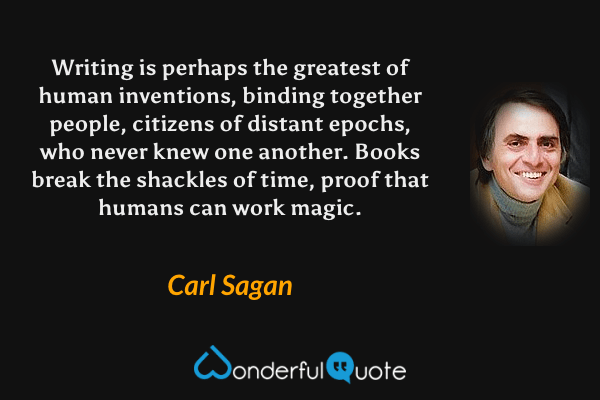
Writing is perhaps the greatest of human inventions, binding together people, citizens of distant epochs, who never knew one another. Books break the shackles of time, proof that humans can work magic.

It seems to me what is called for is an exquisite balance between two conflicting needs: the most skeptical scrutiny of all hypotheses that are served up to us and at the same time a great openness to new ideas.
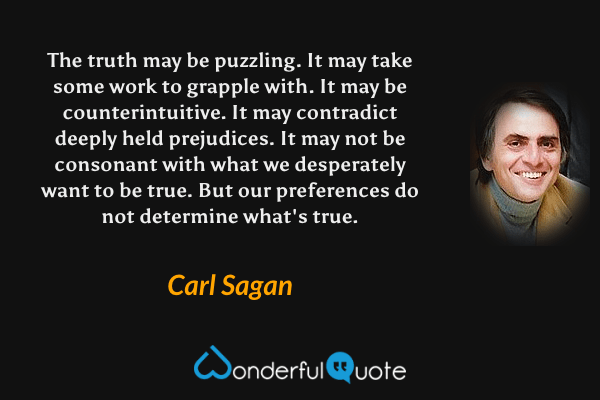
The truth may be puzzling. It may take some work to grapple with. It may be counterintuitive. It may contradict deeply held prejudices. It may not be consonant with what we desperately want to be true. But our preferences do not determine what's true.

Imagine a room awash in gasoline, and there are two implacable enemies in that room. One of them has 9,000 matches. The other has 7,000 matches. Each of them is concerned about who's ahead, who's stronger. Well, that's the kind of situation we are actually in.

You get to thinking of the Earth as an organism, a living thing. You get to worry about it, care for it, wish it well. National boundaries are as invisible as meridians of longitude, or the Tropics of Cancer and Capricorn. The boundaries are arbitrary. The planet is real.

At the very moment that humans discovered the scale of the universe and found that their most unconstrained fancies were in fact dwarfed by the true dimensions of even the Milky Way Galaxy, they took steps that ensured that their descendants would be unable to see the stars at all.

One of the saddest lessons of history is this: If we've been bamboozled long enough, we tend to reject any evidence of the bamboozle. We're no longer interested in finding out the truth. The bamboozle has captured us. It's simply too painful to acknowledge, even to ourselves, that we've been taken.
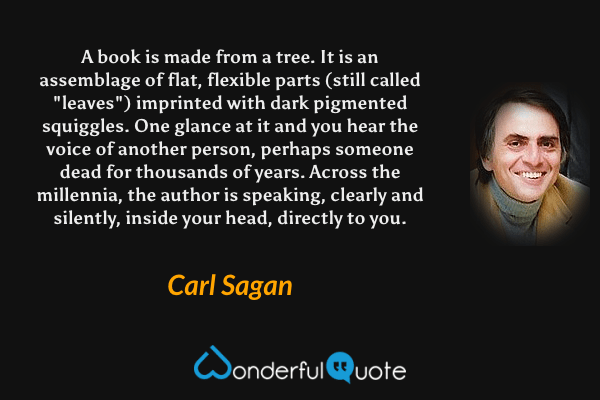
A book is made from a tree. It is an assemblage of flat, flexible parts (still called "leaves") imprinted with dark pigmented squiggles. One glance at it and you hear the voice of another person, perhaps someone dead for thousands of years. Across the millennia, the author is speaking, clearly and silently, inside your head, directly to you.
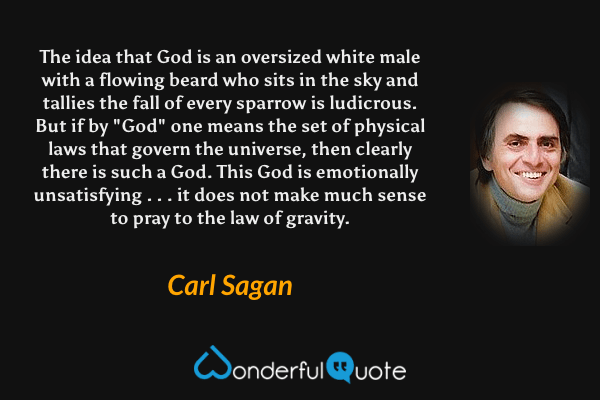
The idea that God is an oversized white male with a flowing beard who sits in the sky and tallies the fall of every sparrow is ludicrous. But if by "God" one means the set of physical laws that govern the universe, then clearly there is such a God. This God is emotionally unsatisfying . . . it does not make much sense to pray to the law of gravity.

We've arranged a civilization in which most crucial elements profoundly depend on science and technology. We have also arranged things so that almost no one understands science and technology. This is a prescription for disaster. We might get away with it for a while, but sooner or later this combustible mixture of ignorance and power is going to blow up in our faces.

In science it often happens that scientists say, 'You know that's a really good argument; my position is mistaken,' and then they actually change their minds and you never hear that old view from them again. They really do it. It doesn't happen as often as it should, because scientists are human and change is sometimes painful. But it happens every day. I cannot recall the last time something like that happened in politics or religion.
Imagination will often carry us to worlds that never were. But without it we go nowhere.
We live in a society exquisitely dependent on science and technology, in which hardly anyone knows anything about science and technology.
The idea that God is an oversized white male with a flowing beard who sits in the sky and tallies the fall of every sparrow is ludicrous. But if by 'God' one means the set of physical laws that govern the universe, then clearly there is such a God. This God is emotionally unsatisfying ... it does not make much sense to pray to the law of gravity.


